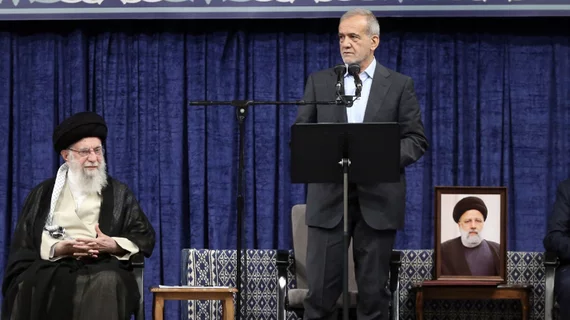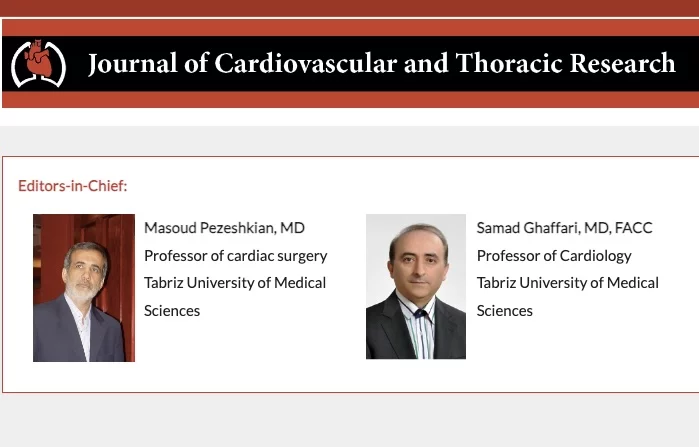World spotlight shines on cardiac surgeon elected president of Iran
Dr. Masoud Pezeshkian became one of the world's most widely known cardiac surgeons when he was inaugurated the president of Iran on July 28. His high status as a cardiac surgeon is noted on the official Government of the Islamic Republic website, that often refers to him simply as the "doctor."
He comes from a healthcare background that spans four decades. He worked as a medic in the Iran-Iraq War, a cardiac surgeon, an academic researcher and one of Iran's deputy health ministers. Beyond the public, political face of Pezeshkian, his physician profile reflects that of a respected cardiac academic similar to those presenting at cardiology conferences and helping push scientific understanding forward.
Pezeshkian is still listed as a co-editor in chief of the Journal of Cardiovascular and Thoracic Research (JCVTR), an international, open access and peer-reviewed journal affiliated with the Iranian Heart Association.
ResearchGate lists 22 publications authored or co-authored by Pezeshkian, and Google Scholar lists 46. Several of these articles list him as first author, including articles on fatty acid composition of epicardial and subcutaneous human adipose tissue profiles in diabetic and non-diabetic candidates for coronary artery bypass graft; hydrocortisone reduces toll-like receptor 4 expression on peripheral CD14+ monocytes in patients undergoing percutanous coronary intervention; analysis of maternal-fetal outcomes of valvular heart surgeries in pregnant women; and the effect of atherogenic diet with or without enzyme inhibitors on the incidence and progress of atherosclerosis in rabbits.
Cardiology articles that cite Pezeshkian as a co-author include clinical and pre-clinical studies on stem cells, epicardial and subcutaneous adipose tissue, biological influencers of angiogenesis, and pharmacotherapy. The most recent article that lists him as a co-author is from 2022 on how dapagliflozin attenuates high glucose‐induced endothelial cell apoptosis and inflammation through AMPK/SIRT1 activation.
The rise of Pezeshkian through medicine and politics in Iran
Born in 1954 in the city of Mahabad to his Azeri father and Kurdish mother, both part of minority ethnic groups in Iran, Pezeshkian earned a diploma in food industry at Urmia Agricultural Academy in his home province of West Azarbaijan, Iran, before entering military conscription service in 1973. He is said to have became interested in medicine when in the military.
After completing his military service in 1976, he received his second diploma in experimental sciences. He was admitted to medical school at the Tabriz University of Medical Sciences in 1977. Pezeshkian finished his general practitioner course in 1986 and then taught physiology at the medical school.
The Islamic Revolution took place in 1979. During the Iran–Iraq War between 1980–1988, Pezeshkian is said to have frequently visited the front lines, where he was responsible for sending medical teams to treat the wounded, working as a fighter and a doctor.
After the war, Pezeshkian continued his education, specializing in general surgery and graduated with an MBBS at Tabriz University of Medical Sciences. In 1993, he received a subspecialty in cardiac surgery from Iran University of Medical Sciences. He become president of Tabriz University of Medical Sciences in 1994.
He entered politics when he was named deputy health minister of the Ministry of Health, Treatment and Medical Education, in 1997 in the first cabinet of President Seyyed Mohammad Khatami, who was in office from August 1997 to August 2005. Khatami was an Iranian reformist politician. Since then, Pezeshkian has been elected to the Iranian parliament five times, and served as thefirst deputy speaker of the parliament from 2016 to 2020. During his time in parliament he also served as a member of the Education and Health Commission.
His wife was a gynecologist. In 1993, she died along with their youngest son in a car accident, which deeply impacted him. He raised his remaining two sons and daughter alone and has never remarried.
Pezeshkian is viewed as a pro-reform politician and refers to his conservative, hardline rivals as the "Taliban." He has made economic arguments to work with the West to lift sanctions because of the severe impact on Iran's economy. He opposed suppression of protests in 2009 and 2019. He also spoke out against the suppression and the cause of the 2022 protests sparked by the death of Mahsa Amini in police custody, who was arrested because she was not wearing a hijab.
“Those who voted for me and the competing candidates, or even did not enter the election field out of concern, criticism, and protest, expect change from the system, me, and the future government, and the time to respond to it practically begins today,” Pezeshkian said this week after his inauguration. “I am still the servant of the noble nation of Iran, who consciously set foot in this arena, and with their vote they put a heavy burden on the shoulders of this humble person in important conditions.”
His choice of first vice president this week was a fellow academic, Mohammad Reza Aref, PhD, who has been involved in politics as a reformer, and previously served in the VP role during Khatami's presidency as a deputy minister of science, and minister of communications and information technology.
Some political experts say expectations on reform or rebuilding relations with the West should be tempered. Barriers exist with the the current issues in the Middle East involving Israel, and because so much power is held by Iran's Supreme Leader Ayatollah Ali Khamenei.
Pezeshkian's limits as a reformer were also immediately put to the test within hours of taking office. Hamas political leader Ismail Haniyeh was killed in an apparent Israeli air strike targeting him in the Iranian capital of Tehran. Haniyeh attended the inauguration and met with Pezeshkian to discuss the war in Gaza. Pezeshkian immediately condemned the attack on Iranian soil and said Iran would respond.


